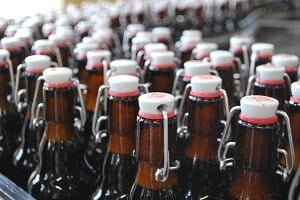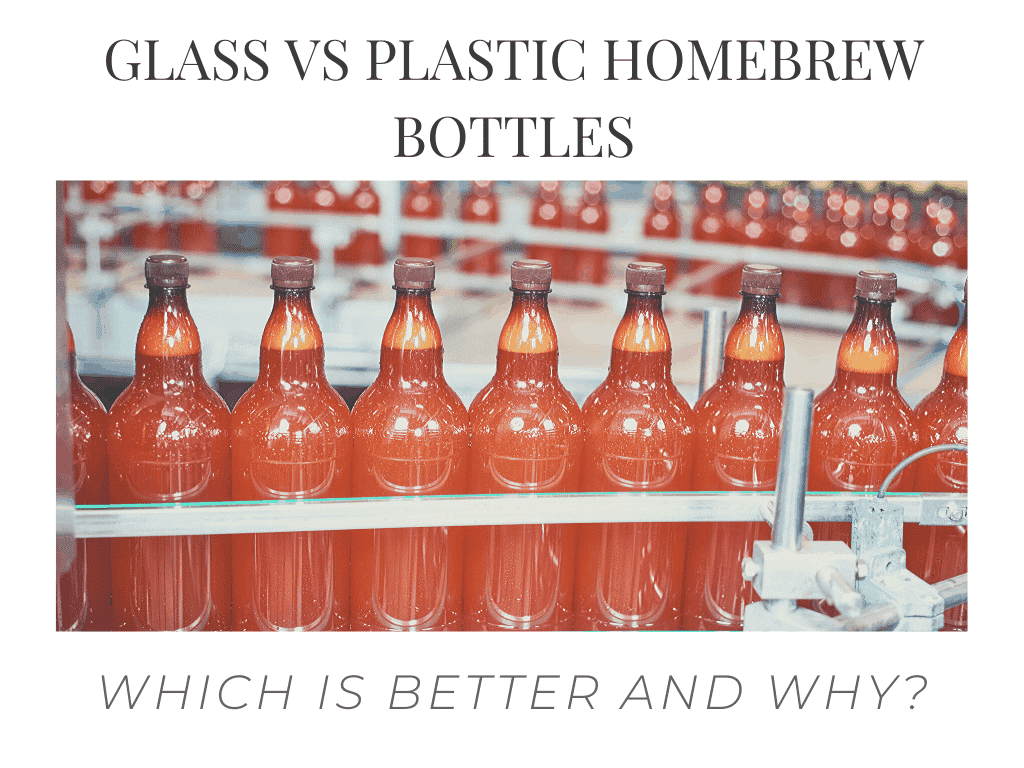If you have read concerns regarding the safety of using aluminum kettles in homebrewing forums, you may have seen contradictory opinions. The debate on whether aluminum is safe for cookware has been around since the ’70s, and the answer may surprise you.
Most health officials agree that cooking with aluminum poses no significant health risks and beer brewed in aluminum kettles does not absorb enough of the metal to be harmful. For context, an antacid tablet contains about 200 mg of aluminum – significantly less than what is absorbed by beer brewed using aluminum kettles.
Read on to learn more about the safety of brewing in aluminum kettles and the pros and cons of using them.
Topics We Cover
Is It Okay To Use Aluminum Pots Or Kettles When Brewing Beer?
The original study in the 1970s that sparked debate on the safety of aluminum cookware has been debunked by the scientific community. The main health risk indicated in that study was Alzheimer’s Disease (AD).
In the study, patients with Alzheimer’s were observed to have high levels of aluminum in their brain tissue. However, it was later pointed out that the study subjects were all in late-stage renal failure, which causes the aluminum to accumulate in the body. Therefore, scientists determined that cooking with aluminum pots was not a contributing factor in the development of the disease.
The normal dietary intake of aluminum is 5-10 milligrams per day. Most non-acidic food (including mash or wort) prepared in aluminum pots or kettles contains about 3.5 milligrams according to a report from the Journal of Food Protection.
To produce neurological effects, aluminum must first enter the bloodstream. Aluminum is not well absorbed by the body. All but 1% is excreted with the urine through the kidneys every 24 hours so very little if any gets absorbed into the blood and sent to the brain.
Scientists agree there is no conclusive evidence that using aluminum pots or kettles for brewing would have a significant negative impact on the brain or neurological system. The normal levels of aluminum from dietary and environmental factors, including cooking in aluminum pots, aren’t enough to produce any severe health issues.
What about people who have kidney issues?
It should be noted that aluminum does accumulate in those with impaired kidney function.
According to a report published in 2014 in the Journal of Occupational Environmental Medicine, the brain changes in patients with aluminum toxicity were not consistent with those present in Alzheimer’s patients leading researchers to conclude that aluminum toxicity is not likely the cause of AD.
Aluminum-linked dementia, however, has been found in elderly dialysis patients when the dialysis fluid is contaminated with aluminum. Dialysis doesn’t efficiently remove aluminum from the body.
What about the safety of using aluminum kettles and cooking at high heat?
When brewing beer, you might wonder if boiling your mash or wort at high heat would change the amount of aluminum that leaches into the contents of your kettle.
In a study published in Environmental Sciences Europe, it was found that higher heat does result in more aluminum being absorbed into the contents of the kettle.
This study indicates that the amount of additional aluminum absorbed is not considered to be statistically impactful in food that is not highly acidic like tomatoes or citrus fruit. Since beer mash and wort are relatively low pH, they will absorb less aluminum from your kettle than making spaghetti sauce.
Beer mash pH is typically 5.2-5.4. Conversely, fresh tomatoes have a pH of 4.6 to 4.9, and canned tomatoes can have a pH of around 3.5.
Keep in mind that the lower the pH, the more acidic the food. Acidic food, especially in older pots that may be scratched and pitted will react more with the metal when cooking.
Do you need to oxidize aluminum kettles before using them?
Aluminum reacts with air in a process is called oxidation. Oxidation binds with the metal and acts as a protective layer to keep the contents of your kettle from reacting with the metal.
Uncoated aluminum kettles will react with the contents being cooked in them. Oxidizing prevents your wort from developing any off-flavors due to interaction with the metal. Most homebrewers oxidize their aluminum kettles before use.
Restaurants also “season” aluminum pots to protect the flavor of the foods cooked in them. Oils from some foods can stay in the pits and scratches as a pot ages, and those flavors can leach into the next dish cooked in them.
Acidic foods, particularly anything tomato-based can also damage pots. Oxidizing the pots prevent both of these issues.
How to oxidize aluminum brew kettles
Putting an oxidized layer on your shiny new brew kettle isn’t difficult. You can achieve the protective layer in about an hour.
To oxidize your new aluminum brew kettle, fill it with water, cover it with a lid and boil for about 60 minutes. Pour the water out and let it dry, or wipe it with a soft cloth. After it’s dry, you should see a grayish discoloration on the metal. This is exactly what you want.
Aluminum is a soft metal that can easily be damaged by improper cleaning. It is important when cleaning your kettles to avoid scrubbing off the oxidized layer by using harsh chemicals like oxygenated cleaners or bleach. This will remove the protective layer and can damage your kettle making it harder to clean.
To clean your kettles, you should use only mild detergent and a soft cloth or sponge. Never use abrasive sponges or scrub hard enough to remove the oxidized patina from the kettle.
If the trub is stuck in the bottom or is hard to remove once you’ve poured the liquid off, try deglazing the pan before washing. Add 1-2 inches of water to the kettle, then heat it for several minutes. This should loosen the attached trub. Try gently pushing the trub off the bottom of the pan with a silicone or wooden spatula or utensil. You should then be able to clean the kettle with little to no scrubbing.
Pros and Cons of Using Aluminum Pots and Kettles in Brewing
Commercial breweries do not frequently use aluminum kettles. Instead most opt for stainless steel brewing equipment.
The main issue with using aluminum pots and kettles in brewing is the inability to use harsh chemicals or scrubbers to clean them. The oxidized coating on the kettles may make it difficult to tell if they are clean. Aluminum kettles have better heat distribution, so they have fewer sticking and burning issues than stainless steel.
Unlike aluminum, the oxidation layer on stainless steel is not visible, so it’s easier to tell when the pot is clean. This is the main reason commercial breweries use stainless steel. Commercial brewers are also able to use more caustic chemicals on their kettles to ensure all organic matter is removed between batches.
With aluminum, the oxidation layer can sometimes make it difficult to tell when the pot or kettle is clean. However, since aluminum has better heat distribution there is less sticking with the trub and no need for harsher chemicals to ensure your kettles are clean.
Still not convinced about using aluminum pots and kettles for brewing? Let’s recap some of the pros and cons of using aluminum kettles for homebrewing compared with their stainless counterparts.
Potential pros of using aluminum kettles
Aluminum has several benefits for homebrewers over stainless steel.
Besides less sticking and easier cleanup, other benefits of using aluminum kettles are:
- Better heat conductivity means contents heat and boil faster, which saves you time.
- Aluminum is considerably cheaper than stainless steel. Aluminum pots that come with lids and are made for frying turkeys can be purchased after Thanksgiving for a very reasonable price.
- Aluminum is lighter in weight than stainless steel.
Potential cons when using aluminum kettles
As noted above, oxidized aluminum may make it harder to tell if your kettles are clean, and you can’t use harsh chemicals to clean them.
Here are a few other cons to using aluminum kettles for brewing:
- Aluminum kettles aren’t as aesthetically appealing to some as stainless steel. They tend to turn dark with use over time.
- Using aluminum kettles without oxidizing the inside may produce off-flavors in your wort.
- Beer should never be stored in aluminum. It can corrode over time and leach higher levels of the metal into the beer.
Many homebrewers use aluminum rather than stainless steel pots and kettles for brewing. Although there are many performance similarities between aluminum and stainless steel, the two biggest considerations for using one over the other are cost and cleaning methods.
Based on the research provided by several studies over the last 50 years, and information obtained from many homebrewers, the consensus is that it’s safe to use aluminum kettles in brewing, and the lower cost compared to using stainless steel is a big bonus.
For the web story version of this article click here!





